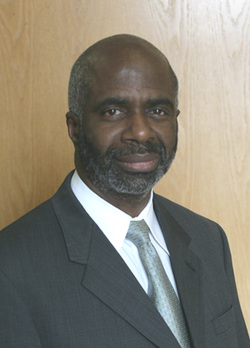
TALLAHASSEE, Fla. - Florida A&M University’s (FAMU) Board of Trustees (BOT) today appointed Larry Robinson as interim president and permitted the resignation of FAMU President James H. Ammons to become effective today.
“I am grateful for this opportunity to serve at this critical time in the university’s history,” said FAMU Interim President Larry Robinson. “There is work to be done and I stand ready to do my absolute best to keep FAMU on its path of success. During this period, I look forward to serving our students, faculty, staff, alumni and supporters.”
Robinson’s appointment is subject to confirmation at the next regularly scheduled BOT meeting. The Board voted to move the previously scheduled September meeting to August.
During Monday’s emergency meeting, the Board agreed to waive Ammons’ contractual requirement of a 90-day notice and make his resignation effective today, July 16. According to
Trustee Chair Solomon Badger III, Ammons will begin his sabbatical leave on Tuesday, July 17. The Board also agreed to pay the 2010-2011 bonus at the minimum contractual level of 25 percent ($81,250) of his base salary of $325,000. Based on the contractual agreement, the Board will also provide Ammons with a 2011-2012 bonus at 5 percent ($17,062), using the annual report he submitted as a basis.
Robinson, who has served twice as university provost, was assistant secretary of commerce for oceans and atmosphere at the National Oceanic and Atmospheric Administration (NOAA); the vice president for research, a professor in the Environmental Sciences Institute (now School of the Environment) at FAMU; and director of the NOAA Environmental Cooperative Science Center (ECSC) headquartered at FAMU, which consisted of a broad, multi-institutional consortium of predominantly minority-serving institutions.
Between 1984 and 1997, Robinson served as a research scientist and a group leader at Oak Ridge National Laboratory. His work there included detection and assessment of special nuclear materials and application of nuclear methods in nonproliferation, environmental science, forensic science and the assessment of high purity materials. From 1997 to 2003,
Robinson directed FAMU’s Environmental Sciences Institute where he led efforts to establish baccalaureate and doctoral degree programs. In 2007, he became the first African American to serve as the science advisor to the United States Department of Agriculture’s Cooperative State Research, Education and Extension Service.
Robinson attended LeMoyne-Owen College in 1975, graduated summa cum laude with a B.S. degree in chemistry from Memphis State University in 1979, and earned a Ph.D. degree in nuclear chemistry from Washington University in St. Louis in 1984.
Ammons during his tenure achieved several milestones:
Source: FAMU Website
“I am grateful for this opportunity to serve at this critical time in the university’s history,” said FAMU Interim President Larry Robinson. “There is work to be done and I stand ready to do my absolute best to keep FAMU on its path of success. During this period, I look forward to serving our students, faculty, staff, alumni and supporters.”
Robinson’s appointment is subject to confirmation at the next regularly scheduled BOT meeting. The Board voted to move the previously scheduled September meeting to August.
During Monday’s emergency meeting, the Board agreed to waive Ammons’ contractual requirement of a 90-day notice and make his resignation effective today, July 16. According to
Trustee Chair Solomon Badger III, Ammons will begin his sabbatical leave on Tuesday, July 17. The Board also agreed to pay the 2010-2011 bonus at the minimum contractual level of 25 percent ($81,250) of his base salary of $325,000. Based on the contractual agreement, the Board will also provide Ammons with a 2011-2012 bonus at 5 percent ($17,062), using the annual report he submitted as a basis.
Robinson, who has served twice as university provost, was assistant secretary of commerce for oceans and atmosphere at the National Oceanic and Atmospheric Administration (NOAA); the vice president for research, a professor in the Environmental Sciences Institute (now School of the Environment) at FAMU; and director of the NOAA Environmental Cooperative Science Center (ECSC) headquartered at FAMU, which consisted of a broad, multi-institutional consortium of predominantly minority-serving institutions.
Between 1984 and 1997, Robinson served as a research scientist and a group leader at Oak Ridge National Laboratory. His work there included detection and assessment of special nuclear materials and application of nuclear methods in nonproliferation, environmental science, forensic science and the assessment of high purity materials. From 1997 to 2003,
Robinson directed FAMU’s Environmental Sciences Institute where he led efforts to establish baccalaureate and doctoral degree programs. In 2007, he became the first African American to serve as the science advisor to the United States Department of Agriculture’s Cooperative State Research, Education and Extension Service.
Robinson attended LeMoyne-Owen College in 1975, graduated summa cum laude with a B.S. degree in chemistry from Memphis State University in 1979, and earned a Ph.D. degree in nuclear chemistry from Washington University in St. Louis in 1984.
Ammons during his tenure achieved several milestones:
- Four consecutive unqualified audits with no findings;
- Full accreditation of the College of Law;
- Reaccreditation of the College of Pharmacy and Pharmaceutical Sciences;
- Worked with the Board of Trustees to develop and implement the 2010-2020 Strategic Plan, “2020 Vision with Courage;”
- Launched the Restructuring Plan;
- All-time high in enrollment in 2010;
- The re-opening of several buildings — a $42 million Teaching Gymnasium, a $12.6 million renovation to Jones Hall, a $16 million renovation to Tucker Hall, a $14.7 million renovation of the Commons Building, and a $13.5 million major renovation of Sampson and Young Halls;
- Bond approval for a $50 million project to construct an 800-bed suite-style residential facility, which will be completed in fall of 2013;
- Renovation of the Gore Education Complex at a cost of $12.4 million.
- The opening of a new center in Crestview that will produce pharmacy graduates who we hope will remain in that area; and
- Launched FAMU’s first on-line degree programs offering master’s degrees in nursing, public health, and business.
Source: FAMU Website
 RSS Feed
RSS Feed